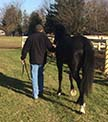In the case of losing racetracks, there’s no going back

There’s always two sides to every story, so I’m not here to play judge and jury, but recently there’s been an outcry on social media, on a few different occasions, in regard to the cancellation of scheduled race cards due to… rain?
Yes, we’ve raced in rain - heavy rain at times - for decades, so it’s hard to imagine why, on a quality, all-weather stonedust track that’s been cared for, we’d ever cancel for rain. The key words there however, being ‘quality stonedust’ and ‘cared for’.
The arguments being made by many horsepeople are not whether the track surfaces in question were still safe at the time of cancellation, but in-fact that they were NOT safe, because the racetracks in question are not investing enough money into materials and/or good help to be sure the racing surfaces remain up-to-par when the bad weather hits.
It’s a good argument, backed by many years of examples that show rain, even in decent amounts, should not be enough to cancel most race cards. But like I said, I’m not here to play judge and jury. What I am here to do however, is comment on some of the solutions people have posted on social media, when it comes to remedying the issue.
Sadly, I see a lot of people saying that these tracks - the ones that are being accused of not holding up their end of the deal when it comes to providing a good, safe place to race - should be closed down.
A common solution in social media-land seems to go:
“If Track A and Track B don’t want to put in the time, money and effort to take care of their facility, then we should shut them down and give their race dates to Track C and Track D… they actually WANT to race!”
Unfortunately that would just be a short term fix… something that we’re pretty good at, but something that is crushing our future.
Just remember please, that in this day-and-age my friends, once racetracks close, they are gone FOREVER.
Think about that word ‘forever’ too, because it’s a bloody-long time.
Soooooo many people that are involved in our game, as bettors, owners, trainers and so-on, have told me that they first got introduced to our sport by going to a track that was in close proximity to them.
“My grandparents grew up in Belleville and would take us to the track on Friday nights.”
“I went to the University of Windsor and we’d go to the races there sometimes to drink and gamble.”
“I grew up in Kingston and we’d walk to the track from our house.”
“We lived in Toronto and would take the streetcar to Greenwood on Saturday afternoons in the winter.”
Heck, just look at the Dan Lagace feature in this very issue, and you’ll see that he got his start by skipping school in Elmira at a very young age and getting a job cleaning stalls at the local track. If there was no track in Elmira at that time, then Dan, and everyone else in his family would be doing something else for a living. It’s factual.
Guess what though? Nobody in Belleville or Windsor or Kingston or Elmira, or a plethora of other cities that no longer have tracks will ever be in close proximity to live racing in those places again.
TORONTO though?!
Yes, even Toronto will NEVER host another harness race for as long as this planet is spinning. Why? Because we left. After more than 200 years of racing in Toronto we willingly left the third largest market in all of Canada and the U.S. (following only New York and L.A.). It’s like a bad dream to me everytime I think about it - always has been.
It’s almost unbelievable really. Why did we leave? Apparently because a few people said they didn’t like shipping into the city to race in the winter months. Hmmmm? I did it for approximately 13 years, in the winter and summer, and it didn’t leave any scars on me.
But that ship has sailed. It’s over for Toronto and Standardbred racing. There’s no going back for us, to the city that had a 2021 population just shy of 2.8 million people.
The bottom line is this: If a track isn’t following the rules, let’s not suggest that we shut them down. Because if we shut them down we’ll never get them back.
There are rules in place and our racetracks are not above them. If a trainer gets their horse to the paddock late, they get fined and the horse gets scratched. If a driver interferes with someone, their horse gets placed and they get fined and/or suspended. If a racetrack is being negligent then please voice your concerns to the authorities and demand action.
Close them down? If it’s true what you say, that the tracks in question don’t really want racing anyway, then you’re playing right into their hands.
Racetracks expose people to racing… period. We obviously don’t have the horse population, the number of fans or the number of participants to sustain a track in every town and city, but it’s a bit of a catch-22…
We need great live racing experiences to attract more new fans and future participants, but without enough fans and participants, it’s tough to create very many great live racing experiences.
Is closing tracks the answer? Not on your life. Every track we close is one that we’ll lose FOREVER, and like I said earlier, forever is a bloody-long time.
Dan Fisher [email protected]

